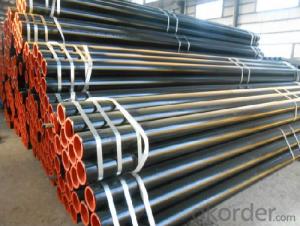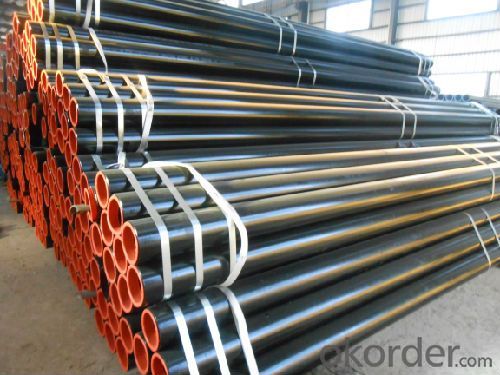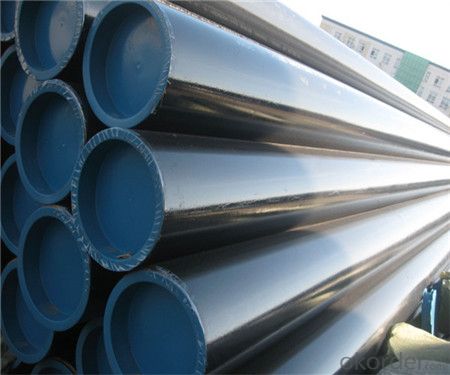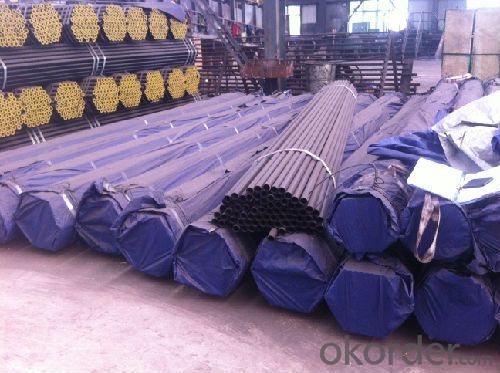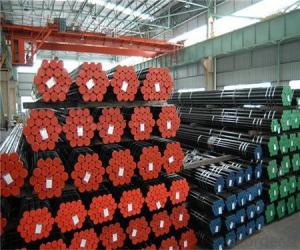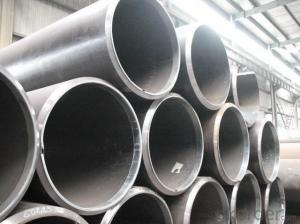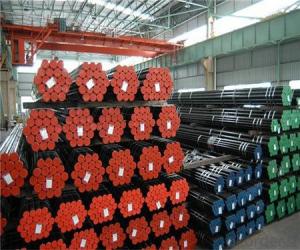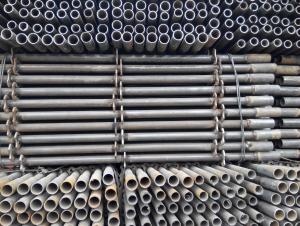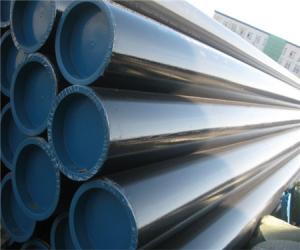50 Mil Aluminum Coil Coated Seamless Steel Pipe and Casing Tube / Apl Spec 5ct China
- Loading Port:
- China Main Port
- Payment Terms:
- TT or LC
- Min Order Qty:
- 30 m.t.
- Supply Capability:
- 12000 m.t./month
OKorder Service Pledge
OKorder Financial Service
You Might Also Like
1、Full series of products provides an easier access for one stop purchase
▲ Line pipe
▲ Tubing and casing
▲ L & M & H boiler tube
▲ Gas cylinder tube & pipe
▲ Mechanical & Structural pipe
▲ Ship-building tube & pipe
▲ Automobile tube & pipe
2、Main Features of the Seamless Pipe ASTM A106/53:
• High manufacturing accuracy
• High strength
• Small inertia resistance
• Strong heat dissipation ability
• Good visual effect
• Reasonable price
1.Seamless pipe professor
2.MTC,ISO,API certificate
3.ASTM,DIN,BS,JIS,GB
4.On time delivery
5.Big store,excellent package
3、Seamless Pipe ASTM A106/53 Specification:
Standard | GB, DIN, ASTM ASTM A106-2006, ASTM A53-2007 |
Grade | 10#-45#, 16Mn 10#, 20#, 45#, 16Mn |
Thickness | 8 - 33 mm |
Section Shape | Round |
Outer Diameter | 133 - 219 mm |
Place of Origin | Shandong, China (Mainland) |
Secondary Or Not | Non-secondary |
Application | Hydraulic Pipe |
Technique | Cold Drawn |
Certification | API |
Surface Treatment | factory state or painted black |
Special Pipe | API Pipe |
Alloy Or Not | Non-alloy |
Length | 5-12M |
Outer Diameter | 21.3-610mm |
Grade | 20#, 45#, Q345, API J55, API K55, API L80, API N80, API P110, A53B |
Standard | ASME, ASTM |
4、Packaging & Delivery
Packaging Details: | seaworthy package,bundles wrapped with strong steel strip |
Delivery Detail: | 15-30days after received 30%TT |
5、FAQ of Seamless Pipe ASTM A106/53:
①How is the quality of your products?
Our products are manufactured strictly according to national and internaional standard, and we take a test
on every pipe before delivered out. If you want see our quality certifications and all kinds of testing report, please just ask us for it.
Guaranteed: If products’ quality don’t accord to discription as we give or the promise before you place order, we promise 100% refund.
②How about price?
Yes, we are factory and be able to give you lowest price below market one, and we have a policy that “ for saving time and absolutely honest business attitude, we quote as lowest as possible for any customer, and discount can be given according to quantity”,if you like bargain and factory price is not low enough as you think, just don’t waste your time.Please trust the quotation we would give you, it is professional one.
③Why should you chose us?
● Full series of products provides an easier access for one stop purchase
▲ Electric Resistance Welded (ERW) Steel Pipe
▲ Longitudinal Submerged Arc Welded (LSAW) Steel Pipe
▲ Spiral Submerged Arc Welded (SSAW) Steel Pipe
▲ Hollow Section (Square and Rectangle Pipe)
▲ Hot Dipped Galvanized Steel Pipe
▲ Professional sales team
▲ Professional engineering and technology team
▲ Professional exportation and contract processing/management team
▲ Professional cooperators and partners
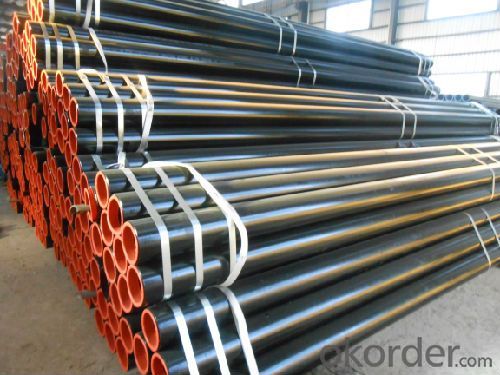
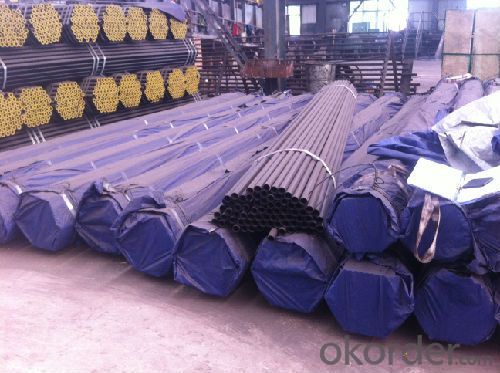
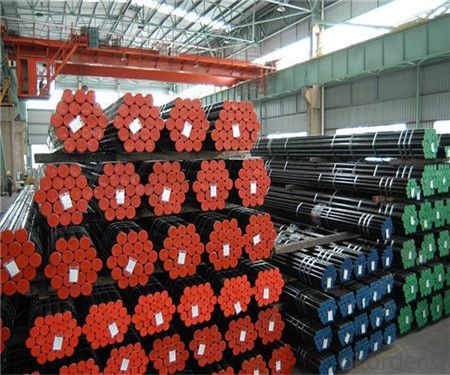
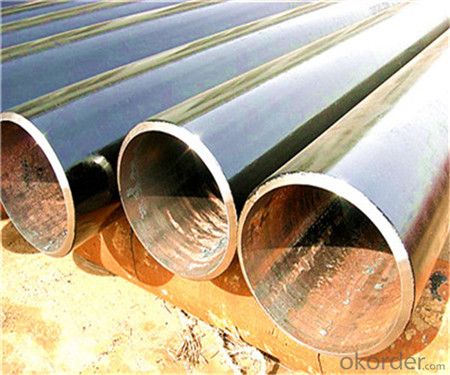
- Q: Can aluminum coils be used in automotive radiators?
- Certainly, automotive radiators can make use of aluminum coils. As a matter of fact, aluminum is extensively employed in radiator production owing to its exceptional heat transfer characteristics and lightweight attributes. The efficiency of aluminum coils in heat dissipation makes them highly favored for automotive purposes. Moreover, aluminum resists corrosion, an imperative feature for a component that interacts with coolant. By employing aluminum coils in automotive radiators, the cooling system's overall effectiveness and performance are enhanced while reducing the radiator's weight. Ultimately, this contributes to improved fuel economy and overall vehicle performance.
- Q: I live in blue ridge ga and have about 2,000 aluminum cans and would like to know how much I can get for them.
- The price for scrap aluminum cans varies litteraly every day. Within the last year, it has been between about 28 cents and 50 cents a pound. The last price I saw for clean, flattened cans delivered to the dealer was about 42 cents. As I said, it could be a bit higher or lower than that now. There are about 30-32 cans per pound of aluminum, so your 2,000 cans probably weigh around 64 pounds and could be worth about $27, assuming there has been no big change in the price recently. But that's a delivered price. If you have to drive 10 miles each way and your truck gets 20 mpg, you will be paying for a gallon of gas. If it is 30 miles each way (60 miles total), you are looking at 3 gallons of gas, which is probably about $8, leaving you a profit of around $19, or maybe a little less. That's with some optimistic assumptions, and it doesn't include the cost of big plastic bags to carry the cans. Not very encouraging, is it? Recycling makes sense for a big city or a recycling center, where they can get thousands of cans a day. But it is hard for an individual to make any money at it. i know this is not what you wanted to hear, but I hope it is helpful anyway.
- Q: why do we use copper more than aluminum? give some characteristic of copper that makes it better then aluminum?
- Unless you have a specific purpose in mind, I don't think copper is used as much as aluminum. Aluminum was used in house wiring for a short time because it is less expensive than the usual copper, but something about it caused house fires. (I think it was thermal expansion caused connections in switches to loosen creating connections that would heat up, or spark.) Copper is preferred for house wiring. Copper is about 3 times more dense, so Al is used where light weight is a consideration. I can't remember the last time I drank something out of a copper can.
- Q: What are the weight and length specifications of aluminum coils?
- Depending on the specific type and purpose of the coil, aluminum coils can have varying weight and length specifications. Typically, the weight of aluminum coils can range from a few hundred pounds to several thousand pounds, while their length commonly varies from a few hundred feet to several thousand feet. Nevertheless, it should be emphasized that these specifications can be tailored to meet the specific requirements of the intended application or industry.
- Q: I've heard many times that it's unhealthy to store or cook food in aluminum, due to leaching, but will this apply to handling aluminum. Also, I heard that most aluminum is coated with a layer of something, to prevent oxidation; is this true?
- aluminum is very biologically unavailable- most forms of aluminium you will come in contact with wont really react with your body. And yes aluminium is actually coated in a thin layer of its own oxide (aluminium oxide) to prevent the entire thing rusting. If it was unsafe to use alot more people would know about it. You are totally fine to grill things in foil and to put foil covered things in the oven!
- Q: The user is inquiring about the possibility of reusing their old aluminum coils or purchasing used ones.
- <p>Yes, you can reuse your old aluminum coils if they are still in good condition and meet the required specifications for your application. Reusing can be cost-effective and environmentally friendly. When buying used coils, ensure they are from a reputable source and have been properly inspected for any damage or wear that could affect performance. It's crucial to verify the coils' integrity and functionality before use to avoid any potential issues in your manufacturing or production process.</p>
- Q: How are aluminum coils used in the production of architectural structures?
- Aluminum coils play a crucial role in the production of architectural structures due to their various advantageous properties. These coils are primarily used in the construction industry for their lightweight, strength, and corrosion resistance. One common application of aluminum coils in architectural structures is in roofing systems. The lightweight nature of aluminum allows for easy installation and reduces the overall load on the building. Additionally, aluminum's corrosion resistance ensures that the roofing system remains durable and long-lasting in various weather conditions. Aluminum coils are also utilized in the fabrication of exterior cladding systems. The coils can be formed into different shapes and sizes, making them suitable for creating unique and visually appealing architectural designs. Furthermore, aluminum's ability to resist corrosion and withstand harsh environmental factors makes it an ideal choice for cladding systems, ensuring the longevity and aesthetics of the structure. In addition to roofing and cladding, aluminum coils are commonly used in the production of windows and doors for architectural structures. The lightweight nature of aluminum makes it easy to handle and install, while its high strength provides structural integrity to these components. Moreover, aluminum's corrosion resistance allows for long-lasting windows and doors that require minimal maintenance. Overall, aluminum coils are an integral part of the production process for architectural structures. Their lightweight, strength, and corrosion resistance make them a preferred choice for roofing, cladding, windows, and doors. By utilizing aluminum coils, architects and builders can create durable, aesthetically pleasing, and sustainable structures that withstand the test of time.
- Q: This question asks for a comparison between standard and non-standard welding wires used with aluminum coils, highlighting their differences.
- <p>Standard welding wire for aluminum coils is designed to meet specific industry standards, ensuring consistent quality and performance. It is made from high-quality aluminum alloys and is tested for properties like tensile strength, ductility, and resistance to corrosion. Non-standard welding wire, on the other hand, may not adhere to these strict specifications and could be made from lower-grade materials. This can result in inconsistent weld quality, weaker joints, and a higher risk of failure. Non-standard wire may also not provide the same level of corrosion resistance, which is critical for aluminum welding applications.</p>
- Q: 1) Do you recycle aluminum (soda cans, etc.)?2) Why do or don't you recycle aluminum?3) Does it make a difference to the economy whether we recycle or not?4) Does it make a difference to the environment whether we recycle or not?5) What do you think would help people to recycle more? Such as a reward, information, resources, etc. Don't feel the need to limit responses. Thank you.
- 1) Yes, I recycle aluminum. 2) I recycle to help from having to have so much in garbage dumps and to get a little extra cash. 3) I feel that recycling helps the economy by reusing aluminum and not having to spend so much time money manufaturing new aluminum and creating some jobs in the recycling field. 4) Recycling aluminum helps the environment by having less aluminum in land fills or alongside the roads. 5) I think more people would recycle aluminum if there was a reward or if you could get a higher price for the aluminum when recycling. Too many people feel the amount of money they can get for reycling aluminum, is not worth their time or the trouble.
- Q: Does anyone know of any men's deodorant that doesn't contain aluminum? It has to be strong, as I do sweat a lot.
- Both my Speed Stick Original Scent and Old Spice High Endurance Original contain no Aluminum. They are both deodorants, NOT antiperspirants, which work differently. Deodorants do not inhibit sweating, they just keep you from smelling funky from it. Hence the name DEodorant. Antiperspirants on the other hand DO inhibit sweating as well as keep you smelling fresh. They do so by clogging your pores! And if there is aluminum in it, it can cause irritation on some people. Most antiperspirants contain aluminum, most deodorants do not. Whichever you end up going with just read the back label.
Send your message to us
50 Mil Aluminum Coil Coated Seamless Steel Pipe and Casing Tube / Apl Spec 5ct China
- Loading Port:
- China Main Port
- Payment Terms:
- TT or LC
- Min Order Qty:
- 30 m.t.
- Supply Capability:
- 12000 m.t./month
OKorder Service Pledge
OKorder Financial Service
Similar products
Hot products
Hot Searches
Related keywords
